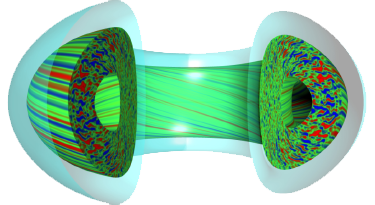Speaker
Description
Present and future fusion devices have to analyse a huge amount of measurements coming from many diagnostic systems. The information obtained from these measurements are and will be used for machine control and safety as well as physics studies. Integrated Data Analysis (IDA) in the framework of Bayesian probability theory provides a concept to analyse a coherent combination of measured data from heterogeneous diagnostics including their statistical and systematic uncertainties and to combine them with modelling information to optimize information available for plasma operation and physics studies. Different techniques for measuring the same subset of physical parameters provide complementary and redundant data for, e.g., improving the reliability of physical parameters, increasing the spatial and temporal resolution of profiles, allowing for new analysis approaches based on diagnostics interdependencies, resolving data inconsistencies, and for reducing the ambiguity of parameters to be estimated without employing non-physical constraints.
Nowadays ample experience exist from applying IDA at various fusion devices, such as W7-AS, ASDEX Upgrade, JET, W7-X, TJ-II, and MST RFP, and for estimating various sets of physical parameters. Based on this experience and due to the conceptional clearly defined Bayesian approach an open-source IDA toolbox, written in python and designed to be modular and flexible to be used at present and next generation fusion devices is presently under development. A summary of the IDA ingredients, the status of the newly developed IDA platform, the linkage with the ITER:IMAS data base and recent applications will be presented.
| Country or International Organisation | Germany |
|---|---|
| Affiliation | Max Planck Institute for Plasma Physics, Garching, Germany |

